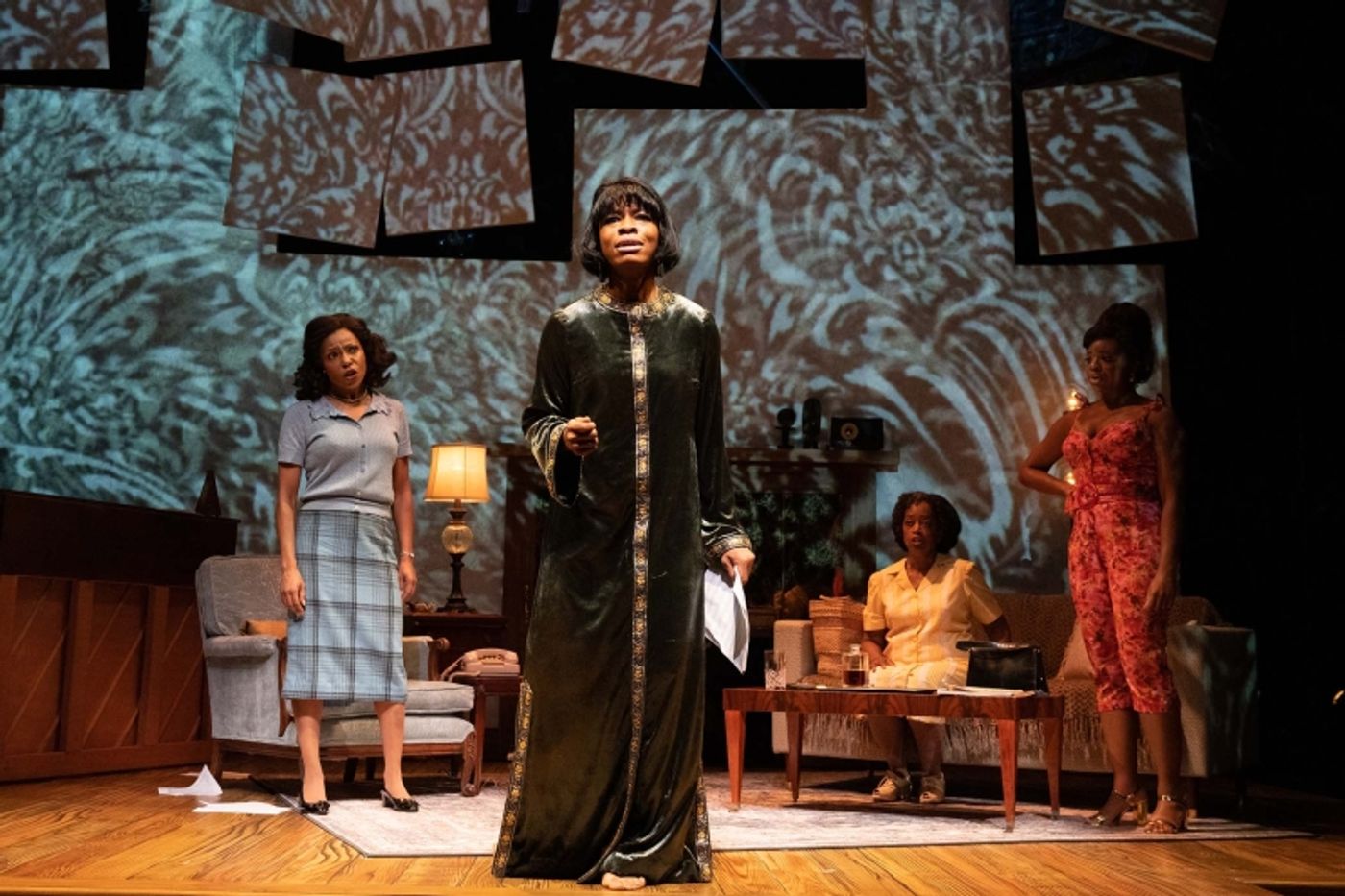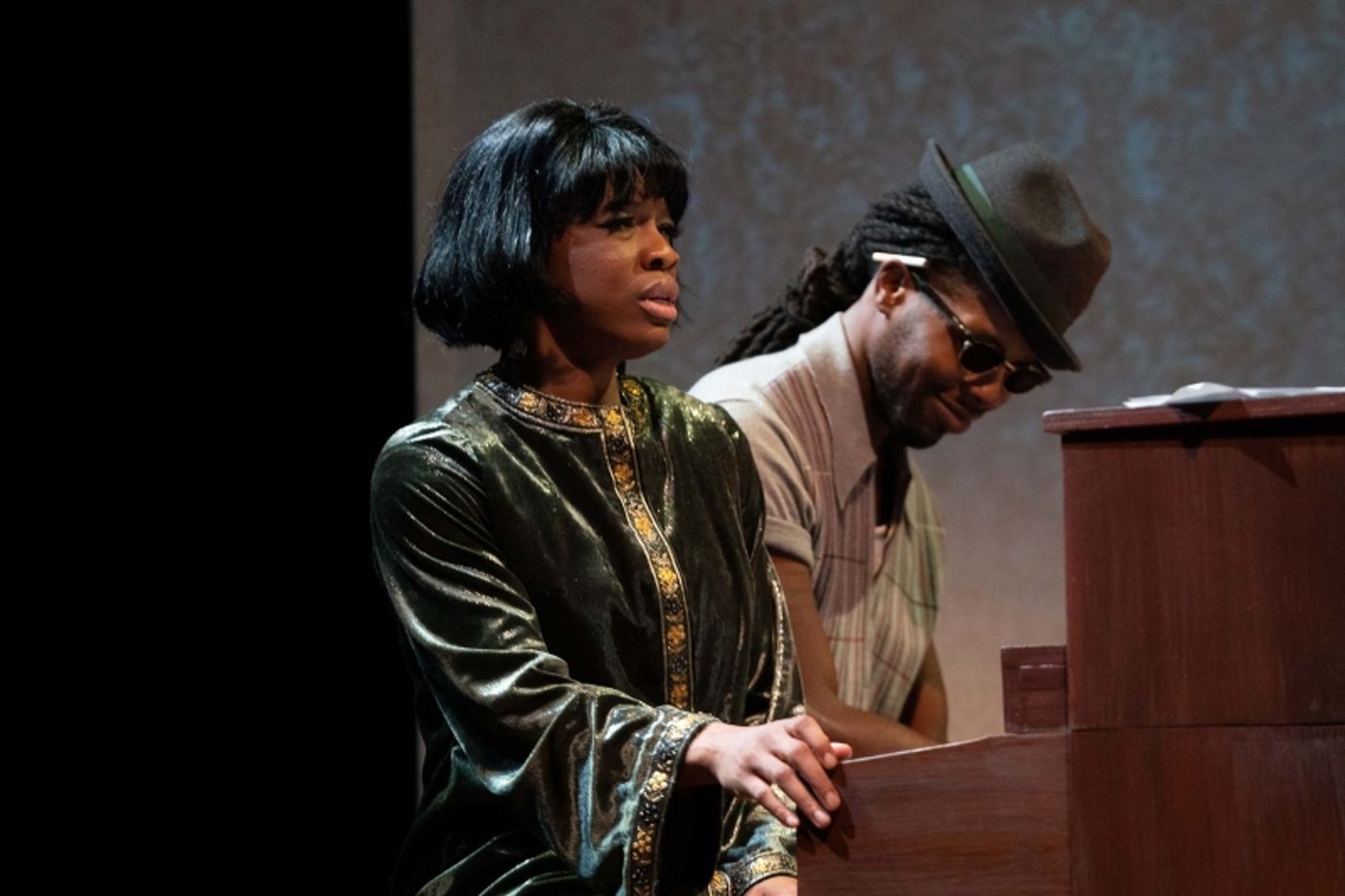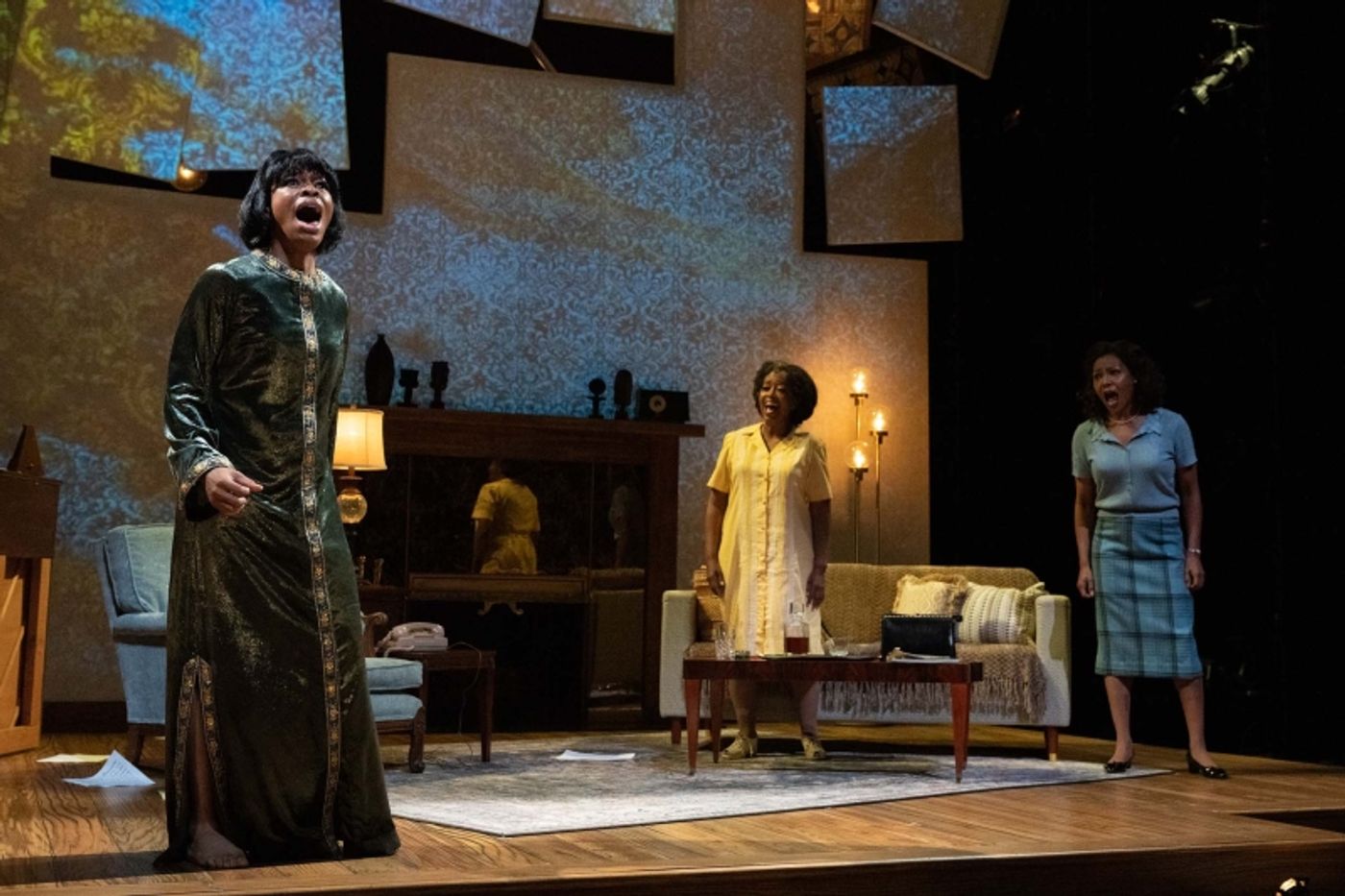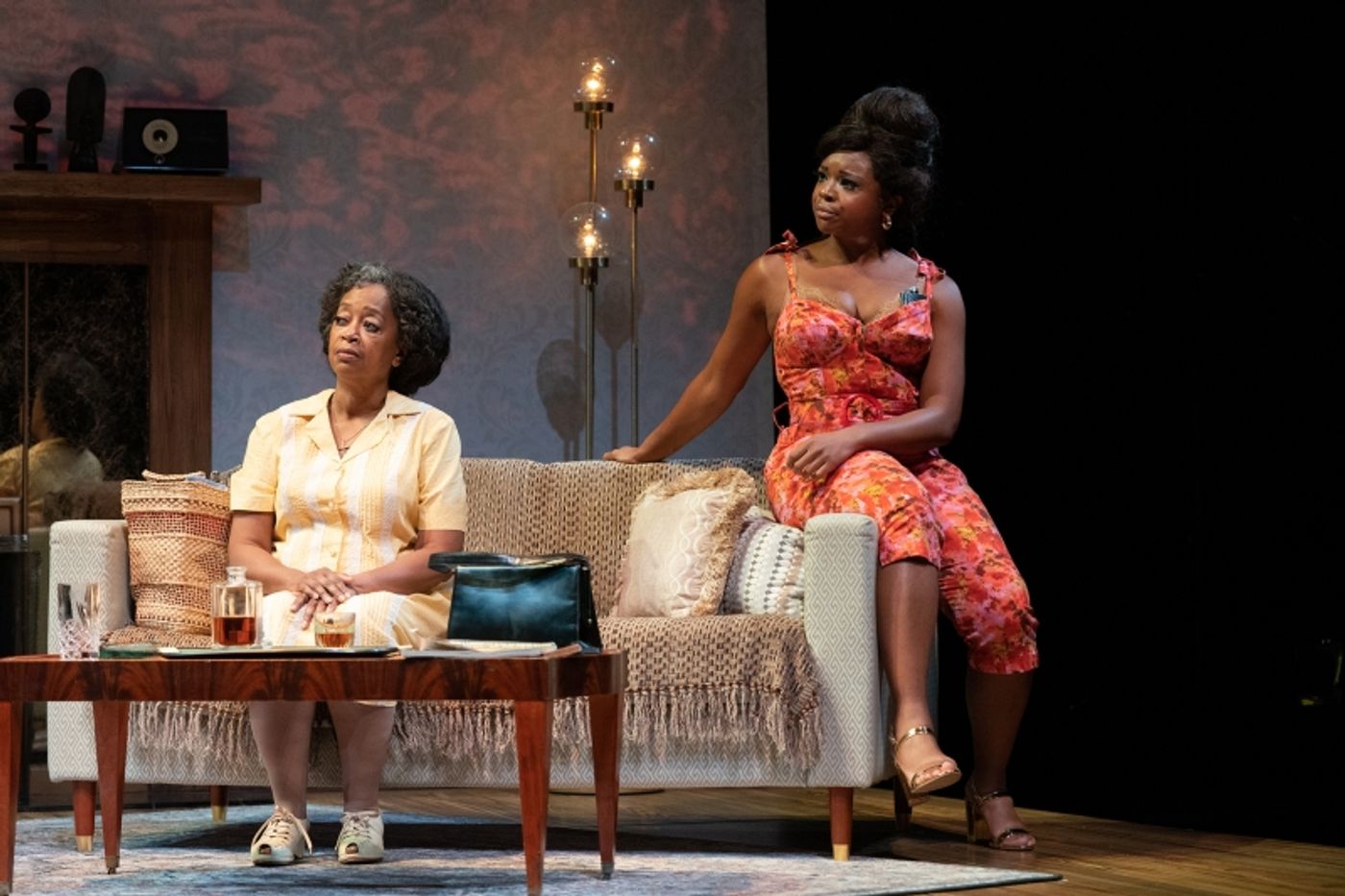Review: Powerful Play NINA SIMONE: FOUR WOMEN Stirs at South Coast Repertory
Christina Ham's play imagines the moment an artist crafts musical activism from deep, searing pain.

and Meredith Noël. Photo by Jenny Graham/SCR.
As you enter the theater and take your seat to experience Christina Ham's stirring play NINA SIMONE: FOUR WOMEN---now on stage at OC's South Coast Repertory in Costa Mesa through October 23, 2022---you'll immediately notice its striking set (designed by Jack Magaw with projections designed by Yee Eun Nam) that depicts a nice, typical upper middle-class home, circa 1960's. But as you tilt your gaze upward, you'll see a frozen-in-time moment that depicts what appears to be a rather violent explosion, breaking off panels of the home's living room wall. Behind it, this phantom explosion sends objects such as folding chairs, stained-glass windows, and beams of shattered lumber flying outward.
The visual metaphor is a stark reminder of not only the show's historical time setting but also the traumatic event that sets off our title figure's contemplative and arduous quest to create a powerful protest anthem that properly and effectively addresses the specific event in question, as well as, by extension, the entire notion of violent racial injustice against all Black people as a whole.
And when the dust finally settles on this one tumultuous, emotionally-exhausting songwriting session, the song that finally emerges will mark the beginning of then up-and-coming jazz artist Nina Simone's continued future works that seamlessly combine both her artistic and activist tendencies.
Directed with palpable ferocity by Logan Vaughn and beautifully acted (and sung) by an exquisite ensemble of gifted actors, NINA SIMONE: FOUR WOMEN is a thoughtful, gut-wrenching play---punctuated with spectacular musical performances---that dives deep into the soul-baring creative process of an artist hoping to craft a seminal work of musical art, and to ensure to have that art say something profound, and be a loud, defiant voice against racially-motivated societal injustice.
Taking place on September 16, 1963---one day after the horrific bombing of the 16th Street Baptist Church in Birmingham, Alabama that killed four young black girls---the fictional play imagines what it would have been like to be a fly on the wall witnessing Ms. Simone's intense struggles to write her first protest anthem, an important composition that will eventually become her controversial song "Mississippi Goddam."
Still haunted by the recent assassination of civil rights activist Medgar Evers in Mississippi and, now, even more shaken by this fatal church bombing in Birmingham the day before, singer/songwriter Nina Simone (brilliantly played by Chibuba Osuala in a truly tour-de-force turn) decides to sequester herself in her home in Mt. Vernon, New York with the goal of emerging with a new song that best represents her and her community's outrage about these recent events.

Up until this point, the Julliard-trained classical songstress had gained some fame (but, sadly, not much significant fortune) from the success of her recording of Gershwin's "I Loves You, Porgy" from the musical PORGY AND BESS, a track off her eventual debut album Little Girl Blue that is beautifully sung live at the top of the show.
But the church bombing---yet another occurrence of senseless violence perpetrated by white supremacists against the Black community---was essentially the last straw for Ms. Simone, igniting her need to express her outrage in the only way she knows can make an impact: music.
"Music is my activism!" she defiantly screams out. "I need to put this anger into my songs... these notes are my daggers!"
And thus begins what would become a career as a music artist with a pronounced activist bent.
Her process, however, is fraught with internal doubts, nagging demons, and exponential pressures, hampered further by a trio of divergent personalities that, one by one, invade her creative cocoon like Ebenezer Scrooge's ghosts did... all offering pointed observations, sage advice, some creative launchpads, and, at times, even biting admonishments and harsh criticisms.
We as an audience are initially left to wonder... are these visitors just ghostly spirits from her past providing her with spiritual and creative guidance or are each of these women of color a representation of the different sides of her personality clashing for dominance (much like in the Pixar film Inside Out)?
Or, perhaps, these women are each an imagined representation of the different archetypes of African American women, which, in an indirect way, all co-exist in some percentage amongst not only all black women but within Ms. Simone herself? More importantly, how can she get these women's opinions aligned to help her goal?
For close observers, the trio of women plus Nina, of course, add up to represent the aforementioned four women in the play's title---which is itself inspired by Ms. Simone's own similarly-titled song "Four Women," a song that describes four different women of color, one with "black" skin, one with "yellow" skin, one with "tan" skin, and one with "brown" skin. It's a song she will write in the near future that depicts four separate black women's personal stories, all of which are carried over from that song to this play.

Photo by Jenny Graham/SCR.
As each "visitor" makes their appearance, Ms. Simone is perplexed as to who exactly each of them are and why they are there. Are these women real or are they just figments of her overstimulated mind manifested by a creative block-induced nervous breakdown?
"You sent for me," each visitor responds, with an air of knowing mystery.
But their intrusiveness has happened for a reason.
Ms. Simone's first unexpected visitor is Auntie Sarah, a doting, motherly figure played with a quiet but resilient regal-ness by the impressive Jennifer Leigh Warren. Sarah, the most mature and grounded of Ms. Simone's visitors, doles out pearls of wisdom from a long-lived life seemingly filled with hardships and struggle---and having to just deal with it all as best as she could. With age comes warnings from lessons learned and a kind of knowledge that comes from an experience fraught with true danger, which explains why Sarah seems maternally protective (and occasionally judgmental) of Ms. Simone.
The next visitor is Sephronia, played with superb intensity by Arie Bianca Thompson. A self-described activist, Sephronia, dressed in neatly-pressed clothing, also admits to a life of some privilege---perhaps afforded by her light skin---even though, as a biracial woman, she very much still feels like an "other." She is wary of Nina's ferocious anger, fearing that her approach with activism with such a hostile song will actually be more of a detriment to the community, derailing any progress in acceptance and tolerance from the very people who seek to oppress all people of color.
Finally, there is the mesmerizing Meredith Noël who plays the brash and outspoken Sweet Thing, an unashamed street-walker who takes full advantage of her sexuality to get by, even if it means having to deal with the judgment of others. For her part, she is very much in favor of Nina's fiery emotions... perhaps because it's about damn time to stand up to it all.
As she struggles to write the song while arguing with these combative outsiders that have invaded her safe space with their divergent opinions and experiences, she is constantly haunted by the booming sounds of explosions---the explosions, perhaps, of the bombs that were set off at that church in Birmingham. It's her constant reminder for why she's writing the song in the first place... in honor of those four girls who suffered a tragic death.
But despite their commonalities as women of color, will they ever agree on anything?

Powerful and poetic, NINA SIMONE: FOUR WOMEN is an intense drama that gives voice to an artist many of us may know little about, while also shedding light on the lived experiences of different women of color. Equally entertaining, enlightening, and educational, the play is a stirring portrait of a tortured artist yearning to have her voice heard, even if it means listening to something that would make the masses uncomfortable. For this production in particular, this cast (which also includes on-stage accompanist and musical director Richard Baskin Jr. who plays Sam Waymon, Nina's real-life brother and collaborator) elevates the material ten-fold, especially in their individual and collective musical performances that sear into your soul.
While I wish the play would have introduced Ms. Simone's visitors all in the beginning to better set up the premise that they are, essentially, her spirit-muses, the gradual introduction of each of the three women delayed the magic of all four women sharing the stage. I may not be alone in this, but I feel as if we needed to hear more about Sweet Thing's experiences, but her late introduction shortens her narrative to a swift drive-by rather than a proper get-to-know-you that was afforded Auntie Sarah and Sephronia.
Ms. Simone was certainly way ahead of her time, but, in a way, also arrived at the right time... and this beautiful play celebrates that artistry with a notable grace and reverence. Thankfully, her powerful, thought-provoking anthems never stopped at just the one she struggled to write here.
* Follow this reviewer on Twitter: @cre8iveMLQ *
[This review has been edited for corrections. We apologize for the error.]
-----
Photos by Jenny Graham for South Coast Repertory.
Performances of Christina Ham's NINA SIMONE: FOUR WOMEN directed by Logan Vaughn continue at South Coast Repertory through October 23, 2022, with an additional evening performance added on October 23, 2022. Tickets can be purchased online at www.scr.org, by phone at (714) 708-5555 or by visiting the box office at 655 Town Center Drive in Costa Mesa.
***
Reader Reviews
Videos

